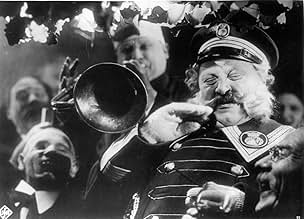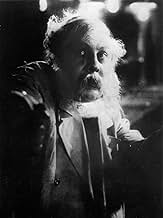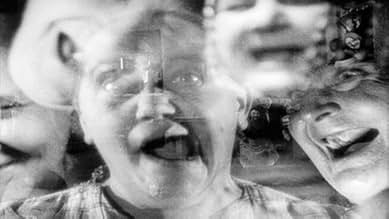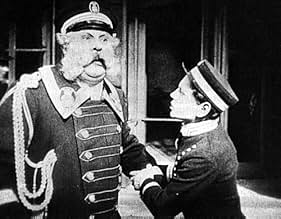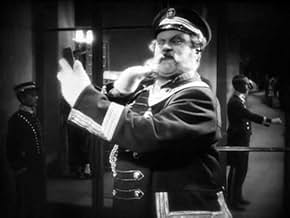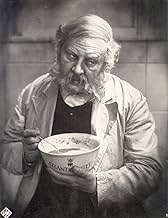AVALIAÇÃO DA IMDb
8,0/10
16 mil
SUA AVALIAÇÃO
O porteiro de um luxuoso hotel enfrenta as consequências de envelhecer e o escárnio dos vizinhos e da sociedade após ser demitido da prestigiada função.O porteiro de um luxuoso hotel enfrenta as consequências de envelhecer e o escárnio dos vizinhos e da sociedade após ser demitido da prestigiada função.O porteiro de um luxuoso hotel enfrenta as consequências de envelhecer e o escárnio dos vizinhos e da sociedade após ser demitido da prestigiada função.
- Direção
- Roteirista
- Artistas
- Prêmios
- 2 vitórias no total
O.E. Hasse
- Small Role
- (não creditado)
Harald Madsen
- Wedding Musician
- (não creditado)
Neumann-Schüler
- Small Role
- (não creditado)
Carl Schenstrøm
- Wedding Musician
- (não creditado)
Erich Schönfelder
- Small role
- (não creditado)
Avaliações em destaque
F.W Murnau is best known for his expressionistic horror movies, such as 'Nosferatu' and the excellent 'Faust'. This movie is somewhat different from those, as it's a more personal and down to earth sort of tale. Still, despite this not being a member of the horror genre; Murnau's style still allows for much of the great visuals that made his horror movies great. The story itself has definite horror elements, which although they don't involve vampires or the devil; are arguably more frightening, as it dictates and event that could well happen to anyone. The film tackles the idea of 'downfall', and as the prologue states; one can be a prince one day, but what is he tomorrow? This tale is told through the story of a hotel porter that has worked hard all his life but loses his job through incredible bad luck when the manager catches him taking a break. Heartbroken and humiliated, our hero is offered another job; but it only allows for his humiliation to continue, as the job is that of a lowly bathroom attendant. We then follow his struggle as he comes to terms with his loss and the reaction of his family and neighbours.
F.W. Murnau uses no story cards for this silent film, which shows his flair for storytelling. Imagining some of today's 'great' filmmakers telling a story without dialogue is preposterous, but Murnau shows his prowess by doing just that, and doing it down to a fine art. People often cite 'Citizen Kane' for being the film that took storytelling to the next level, and although it did do that; surely some of the credit has to go to F.W. Murnau. This film features what is perhaps the first ever fantasy sequence, a sequence that is, of course, a favourite of today's cinema. Murnau's technical mastery is also shown in many other sequences, including one in particular that sees a scene appear in the middle of a letter. It's quite unbelievable that this was made over eighty years ago, just due to the amazing work on show in the film.
The film falls down a bit towards the end, because of an ill-advised twist. This was put upon F.W. Murnau by the studio releasing the film, who wanted a happy ending. This is just another example of a studio spoiling a great movie, and even before I saw that piece of information in the trivia section for this movie; it was evident to me that it isn't the way that Murnau wanted to take the story from the way it almost appeared to be tacked on to the end of the film. Still, the hour and ten minutes running up the ending are almost as good as silent cinema gets, and in spite of the studio's best efforts to ruin it; The Last Laugh stands tall as on of Murnau's finest films.
F.W. Murnau uses no story cards for this silent film, which shows his flair for storytelling. Imagining some of today's 'great' filmmakers telling a story without dialogue is preposterous, but Murnau shows his prowess by doing just that, and doing it down to a fine art. People often cite 'Citizen Kane' for being the film that took storytelling to the next level, and although it did do that; surely some of the credit has to go to F.W. Murnau. This film features what is perhaps the first ever fantasy sequence, a sequence that is, of course, a favourite of today's cinema. Murnau's technical mastery is also shown in many other sequences, including one in particular that sees a scene appear in the middle of a letter. It's quite unbelievable that this was made over eighty years ago, just due to the amazing work on show in the film.
The film falls down a bit towards the end, because of an ill-advised twist. This was put upon F.W. Murnau by the studio releasing the film, who wanted a happy ending. This is just another example of a studio spoiling a great movie, and even before I saw that piece of information in the trivia section for this movie; it was evident to me that it isn't the way that Murnau wanted to take the story from the way it almost appeared to be tacked on to the end of the film. Still, the hour and ten minutes running up the ending are almost as good as silent cinema gets, and in spite of the studio's best efforts to ruin it; The Last Laugh stands tall as on of Murnau's finest films.
I just viewed this film on the pristine Kino video release, having seen a poorish print years ago.
One of the great classics of the German silent cinema, hugely influential, this true work of art not only displays the seemingly limitless resources of the UFA studios, but dares to break constantly with convention, particularly by being a "pure" film and dispensing with intertitles, but most spectacularly in its use of the "subjective" camera--creating as far as I know, the first sustained use of "point of view" in the history of movies, which had hitherto shown us action objectively, as it were: the spectator had always merely "observed," as in a third person narrative. Even Griffith and Bitzer's trucking shots, while including "us" in the action, did not represent another character's point of view. Well, after "the Last Laugh," P.O.V. turns up again and again. (See Abel Gance's "Napoleon.") Today the technique is common (necessary!). The most famous shots in "Der Letzte Mann" include the drunken swaying of the room seen through the Doorman's bleary eyes (cinematographer Karl Freund seated in a large swing and pushed back and forth); the opening shot coming down into the lobby by elevator and exiting the gate; and the astonishing vision of the hotel toppling in slow motion over on the poor doorman after his demotion. And can you believe that first night cityscape with the driving rain was all constructed and shot INDOORS?
However, I must say there is an unfortunate message in this drama, that of the merciless German stereotype: fawning before authority and deriding weakness--humiliating the powerless, admiring, almost worshiping the powerful. This is shown by the doorman's vanity and puffed-up self-image, which hinges, it seems, on a splendid uniform and the deference it alone inspires. Position is everything to him, his family, employers, hotel guests and neighbors. This is a shallow world, indeed, a social mentality that I can imagine, without straining too much, easily leading in a few brief years straight to the all-too-successful Gestapo! (I would add that the ending seems to contradict this, but the ending must be discounted; it is a sheer fantasy, "tacked on," really unrelated to the rest of the film and completely out of character.)
One of the great classics of the German silent cinema, hugely influential, this true work of art not only displays the seemingly limitless resources of the UFA studios, but dares to break constantly with convention, particularly by being a "pure" film and dispensing with intertitles, but most spectacularly in its use of the "subjective" camera--creating as far as I know, the first sustained use of "point of view" in the history of movies, which had hitherto shown us action objectively, as it were: the spectator had always merely "observed," as in a third person narrative. Even Griffith and Bitzer's trucking shots, while including "us" in the action, did not represent another character's point of view. Well, after "the Last Laugh," P.O.V. turns up again and again. (See Abel Gance's "Napoleon.") Today the technique is common (necessary!). The most famous shots in "Der Letzte Mann" include the drunken swaying of the room seen through the Doorman's bleary eyes (cinematographer Karl Freund seated in a large swing and pushed back and forth); the opening shot coming down into the lobby by elevator and exiting the gate; and the astonishing vision of the hotel toppling in slow motion over on the poor doorman after his demotion. And can you believe that first night cityscape with the driving rain was all constructed and shot INDOORS?
However, I must say there is an unfortunate message in this drama, that of the merciless German stereotype: fawning before authority and deriding weakness--humiliating the powerless, admiring, almost worshiping the powerful. This is shown by the doorman's vanity and puffed-up self-image, which hinges, it seems, on a splendid uniform and the deference it alone inspires. Position is everything to him, his family, employers, hotel guests and neighbors. This is a shallow world, indeed, a social mentality that I can imagine, without straining too much, easily leading in a few brief years straight to the all-too-successful Gestapo! (I would add that the ending seems to contradict this, but the ending must be discounted; it is a sheer fantasy, "tacked on," really unrelated to the rest of the film and completely out of character.)
Der Letzte Mann is nothing short of the epitome of viewing pleasure. Beautifully shot, the urban landscape in which a noble doorman earns his keep (and humanity) is throughout dream-like, infused with a decidedly ethereal quality. Added to a magical visual backdrop is a haunting musical score, highlighted by sweeping cello chords which cut straight to the heart. With regard to prominent themes, the picture speaks volumes about the fragility of human existence and, specifically, human dignity. The shallow and arbitrary nature of a society bent predominantly on the acquisition and elevation of pecuniary wealth, as well as the perseverance of the individual through it all, is illustrated masterfully through both the zenith and nadir of the doorman's existence, as documented in this truly excellent work of the interwar period.
Warning - Possible spoilers lie within.
This is the first silent movie I have watched in its entirety, having previously found myself becoming restless and distracted, I normally find them quite difficult to watch. I came across the Criterion edition of the movie in a large collection of Laserdiscs that I purchased recently, and decided to give it a try. I was speechless.
'The Last Laugh' (or 'The Last Man', as its translation would lead you to believe, is a touching story from director F.W. Murnau about an un-named Hotel Porter & Doorman (played excellently by Emil Jannings) who, through no fault of his own, is demoted to Lavatory attendant, and we hereby watch as his life collapses around him. It's an incredibly emotional story - during his downfall, as his friends and family mock him, Jannings' depressed, hunched-over figure can be painfully sad to watch. I found myself filling up in the scene when he finally hands his beloved porter's uniform over to the night watchman.
A landmark in the era of silent films, Murnau used some very clever camera tricks (such as smearing vaseline on the camera lens for 'dream' sequences). It was also one of the first films to use a completely free moving camera with no tripod, testimony to the success of this can be seen immediately in the first scene as the film starts. There are also no title cards in the film. Nor are they needed - The story is carried perfectly by the actors and on no occasion do you feel that you don't know what is going on.
I won't give anything away here, but there are some people that may feel the ending is a little out of place - However, I had grown so fond on Jannings' character that in a way, I was relieved to see the film move on from the final scene where he is sat hunched on the seat in the washroom - and for him to finally have 'The Last Laugh' so to speak :o)
If you have any interest in old cinema, and have not seen this, or just fancy a change from all of the samey Hollywood flicks being churned out right now, I suggest you hunt out a copy right away. Highly recommended.
This is the first silent movie I have watched in its entirety, having previously found myself becoming restless and distracted, I normally find them quite difficult to watch. I came across the Criterion edition of the movie in a large collection of Laserdiscs that I purchased recently, and decided to give it a try. I was speechless.
'The Last Laugh' (or 'The Last Man', as its translation would lead you to believe, is a touching story from director F.W. Murnau about an un-named Hotel Porter & Doorman (played excellently by Emil Jannings) who, through no fault of his own, is demoted to Lavatory attendant, and we hereby watch as his life collapses around him. It's an incredibly emotional story - during his downfall, as his friends and family mock him, Jannings' depressed, hunched-over figure can be painfully sad to watch. I found myself filling up in the scene when he finally hands his beloved porter's uniform over to the night watchman.
A landmark in the era of silent films, Murnau used some very clever camera tricks (such as smearing vaseline on the camera lens for 'dream' sequences). It was also one of the first films to use a completely free moving camera with no tripod, testimony to the success of this can be seen immediately in the first scene as the film starts. There are also no title cards in the film. Nor are they needed - The story is carried perfectly by the actors and on no occasion do you feel that you don't know what is going on.
I won't give anything away here, but there are some people that may feel the ending is a little out of place - However, I had grown so fond on Jannings' character that in a way, I was relieved to see the film move on from the final scene where he is sat hunched on the seat in the washroom - and for him to finally have 'The Last Laugh' so to speak :o)
If you have any interest in old cinema, and have not seen this, or just fancy a change from all of the samey Hollywood flicks being churned out right now, I suggest you hunt out a copy right away. Highly recommended.
This classic is distinctive in several respects. The expressionistic style and creative camera work, along with a noteworthy leading performance by Emil Jannings, turn a simple story into a thought-provoking experience. It is also very interesting for its almost complete lack of title cards, demonstrating how a skilled practitioner of the art of silent cinema can convey all kinds of attitudes and emotions without employing dialogue of any kind.
The actual story is very simple. Jannings portrays a doorman at a fine hotel, who takes enormous pride in his position, his work, and especially his uniform. One day the hotel manager passes by, misunderstands what he sees, and decides that the doorman is too old for the job. The next day, a new doorman takes his place, and he is relegated to working in the washroom. The rest of the film then shows the effect of this change on the doorman and on the way that others view him and treat him. The plot developments themselves are conveyed efficiently and succinctly, so that the emphasis is on the feelings and perceptions of the characters. The acting, camera work, and settings are all used very carefully to emphasize the changes that take place inside Jannings' character and in the attitudes of others towards him as a result of his demotion.
These changes are often very (deliberately) exaggerated, and there are times when they honestly strain credibility a bit too much. And it is not always easy to watch the doorman's anguish, but it gives you plenty to think about - part of his suffering comes from the foolish attitudes of others, but much of it also comes from his own over-dependence on his position for his happiness. It is remarkable how much is expressed without even using title cards - there is just one in the entire movie, a note that introduces the last part of the film, when further developments occur that introduce a new set of themes.
"The Last Laugh" is worth seeing for anyone who likes silent films, for its thought-provoking story and perhaps even more so for its creative and masterful use of silent film techniques.
The actual story is very simple. Jannings portrays a doorman at a fine hotel, who takes enormous pride in his position, his work, and especially his uniform. One day the hotel manager passes by, misunderstands what he sees, and decides that the doorman is too old for the job. The next day, a new doorman takes his place, and he is relegated to working in the washroom. The rest of the film then shows the effect of this change on the doorman and on the way that others view him and treat him. The plot developments themselves are conveyed efficiently and succinctly, so that the emphasis is on the feelings and perceptions of the characters. The acting, camera work, and settings are all used very carefully to emphasize the changes that take place inside Jannings' character and in the attitudes of others towards him as a result of his demotion.
These changes are often very (deliberately) exaggerated, and there are times when they honestly strain credibility a bit too much. And it is not always easy to watch the doorman's anguish, but it gives you plenty to think about - part of his suffering comes from the foolish attitudes of others, but much of it also comes from his own over-dependence on his position for his happiness. It is remarkable how much is expressed without even using title cards - there is just one in the entire movie, a note that introduces the last part of the film, when further developments occur that introduce a new set of themes.
"The Last Laugh" is worth seeing for anyone who likes silent films, for its thought-provoking story and perhaps even more so for its creative and masterful use of silent film techniques.
Você sabia?
- CuriosidadesThe first "dolly" (a device that allows a camera to move during a shot) was created for this film. According to Edgar G. Ulmer, who worked on the film, the idea to make the first dolly came from the desire to focus on Emil Jannings' face during the first shot of the movie, as he moved through the hotel. They obviously didn't know how to make a dolly technically, so they created the first one out of a baby's carriage. They then pulled the carriage on a sort of railway that was built in the studio.
- Erros de gravaçãoWhen the porter comes home with the stolen coat, the third button down (which fell off earlier) is still there until a close-up of him at the door.
- Versões alternativasThere is an Italian edition of this film on DVD, re-edited in double version (1.33:1 and 1.78:1) with the contribution of film historian Riccardo Cusin. This version is also available for streaming on some platforms.
- ConexõesEdited into Alemanha Nove Zero (1991)
Principais escolhas
Faça login para avaliar e ver a lista de recomendações personalizadas
- How long is The Last Laugh?Fornecido pela Alexa
Detalhes
Bilheteria
- Faturamento bruto nos EUA e Canadá
- US$ 94.812
- Tempo de duração
- 1 h 28 min(88 min)
- Cor
- Mixagem de som
- Proporção
- 1.33 : 1
Contribua para esta página
Sugerir uma alteração ou adicionar conteúdo ausente

